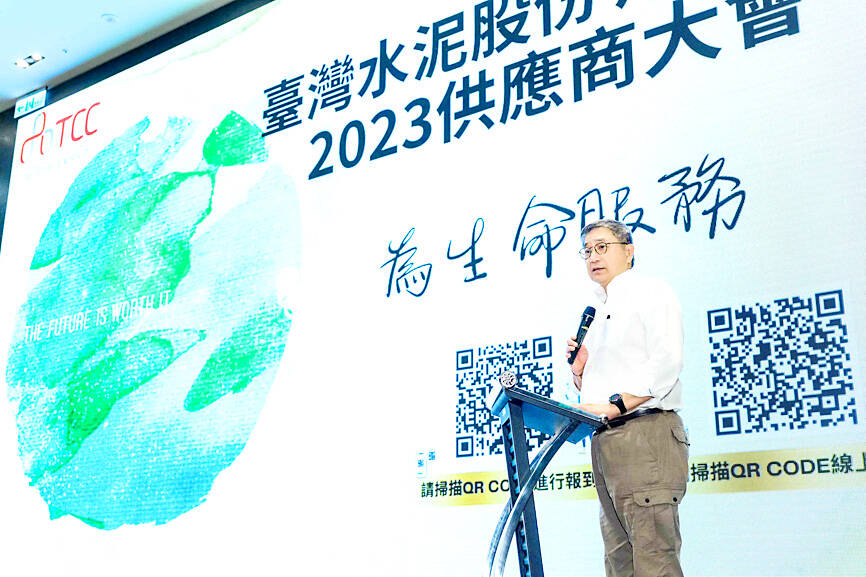Taiwan Cement Corp (台灣水泥) plans to spend up to 770 million euros (US$843.5 million) to boost its holdings in two cement ventures in Turkey and Portugal as demand for low-carbon emissions cement rises in Europe, the company said on Monday.
Taiwan Cement’s board of directors has approved a plan to lift the company’s stake in OYAK Denizli Cimento, a joint venture with Turkey’s OYAK Group, to 60 percent from 40 percent and to increase its stake in Cimpor Portugal Holdings SGPS SA, a Portuguese cement joint venture with OYAK, to 100 percent from 40 percent, it said in a statement.
“Through increased investments in OYAK Denizli Cimento and Cimpor Portugal, Taiwan Cement chairman Nelson Chang (張安平) believes the company is set to become one of the very few low-carbon emissions cement suppliers,” company spokeswoman and chief sustainability officer Shelly Yeh (葉毓君) told a midnight news conference.

Photo courtesy of Taiwan Cement Corp via CNA
The EU taxes cement and some imports of goods produced with high carbon emissions, so low-carbon emissions cement would enjoy a competitive edge over traditional cement, Yeh said.
OYAK Denizli Cimento is the biggest cement supplier in Turkey. It operates seven plants and has a 16 percent market share in the nation.
Lisbon-based Cimpor has a 55 percent market share in Portugal and has operations in Ivory Coast and Cameroon.
Taiwan Cement said it expects to complete the transactions by the end of the first quarter next year.
The company has continued to expand the revenue contribution of low-carbon emissions cement, with such products accounting for 42 percent of its revenue of NT$62.5 billion (US$1.99 billion) in the first half of this year compared with 34 percent in the same period in 2021, company data showed.
Revenue contribution from ordinary Portland cement dropped to 28 percent from 51 percent over the same period, the data showed.
Taiwan Cement said it has a target to reduce cement revenue contribution to 50 percent by 2025 from 85 percent in 2021, with half of its revenue to be from green energy solutions such as batteries and electric vehicle chargers as it transforms from a traditional cement maker into a green-energy service provider.

Semiconductor business between Taiwan and the US is a “win-win” model for both sides given the high level of complementarity, the government said yesterday responding to tariff threats from US President Donald Trump. Home to the world’s largest contract chipmaker, Taiwan Semiconductor Manufacturing Co (TSMC, 台積電), Taiwan is a key link in the global technology supply chain for companies such as Apple Inc and Nvidia Corp. Trump said on Monday he plans to impose tariffs on imported chips, pharmaceuticals and steel in an effort to get the producers to make them in the US. “Taiwan and the US semiconductor and other technology industries

CHIP WAR: Tariffs on Taiwanese chips would prompt companies to move their factories, but not necessarily to the US, unleashing a ‘global cross-sector tariff war’ US President Donald Trump would “shoot himself in the foot” if he follows through on his recent pledge to impose higher tariffs on Taiwanese and other foreign semiconductors entering the US, analysts said. Trump’s plans to raise tariffs on chips manufactured in Taiwan to as high as 100 percent would backfire, macroeconomist Henry Wu (吳嘉隆) said. He would “shoot himself in the foot,” Wu said on Saturday, as such economic measures would lead Taiwanese chip suppliers to pass on additional costs to their US clients and consumers, and ultimately cause another wave of inflation. Trump has claimed that Taiwan took up to

A start-up in Mexico is trying to help get a handle on one coastal city’s plastic waste problem by converting it into gasoline, diesel and other fuels. With less than 10 percent of the world’s plastics being recycled, Petgas’ idea is that rather than letting discarded plastic become waste, it can become productive again as fuel. Petgas developed a machine in the port city of Boca del Rio that uses pyrolysis, a thermodynamic process that heats plastics in the absence of oxygen, breaking it down to produce gasoline, diesel, kerosene, paraffin and coke. Petgas chief technology officer Carlos Parraguirre Diaz said that in

Japan intends to closely monitor the impact on its currency of US President Donald Trump’s new tariffs and is worried about the international fallout from the trade imposts, Japanese Minister of Finance Katsunobu Kato said. “We need to carefully see how the exchange rate and other factors will be affected and what form US monetary policy will take in the future,” Kato said yesterday in an interview with Fuji Television. Japan is very concerned about how the tariffs might impact the global economy, he added. Kato spoke as nations and firms brace for potential repercussions after Trump unleashed the first salvo of